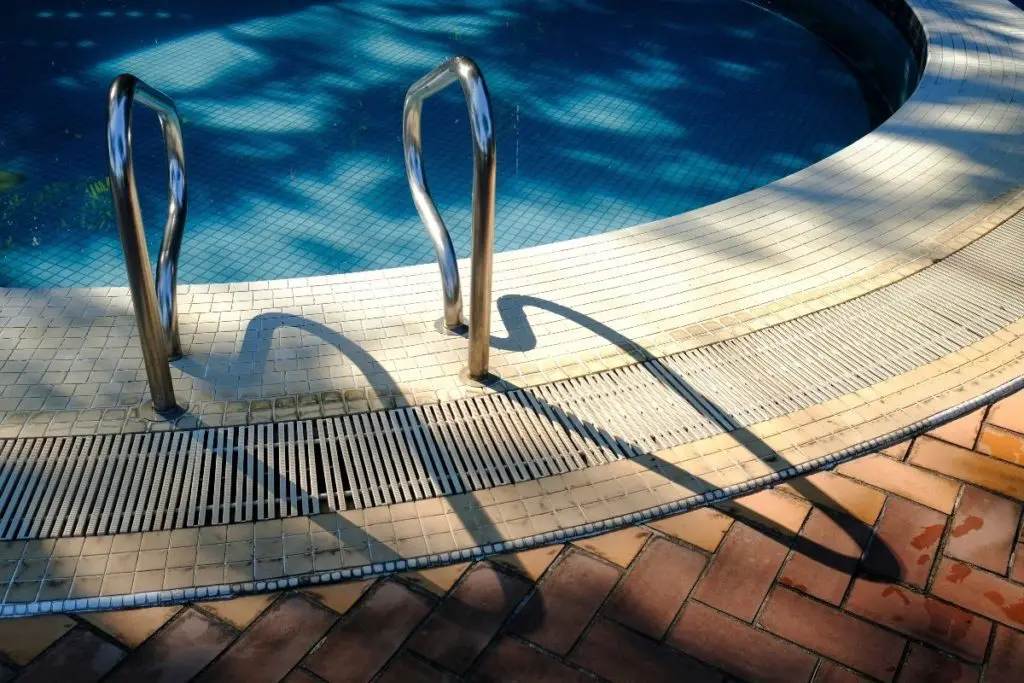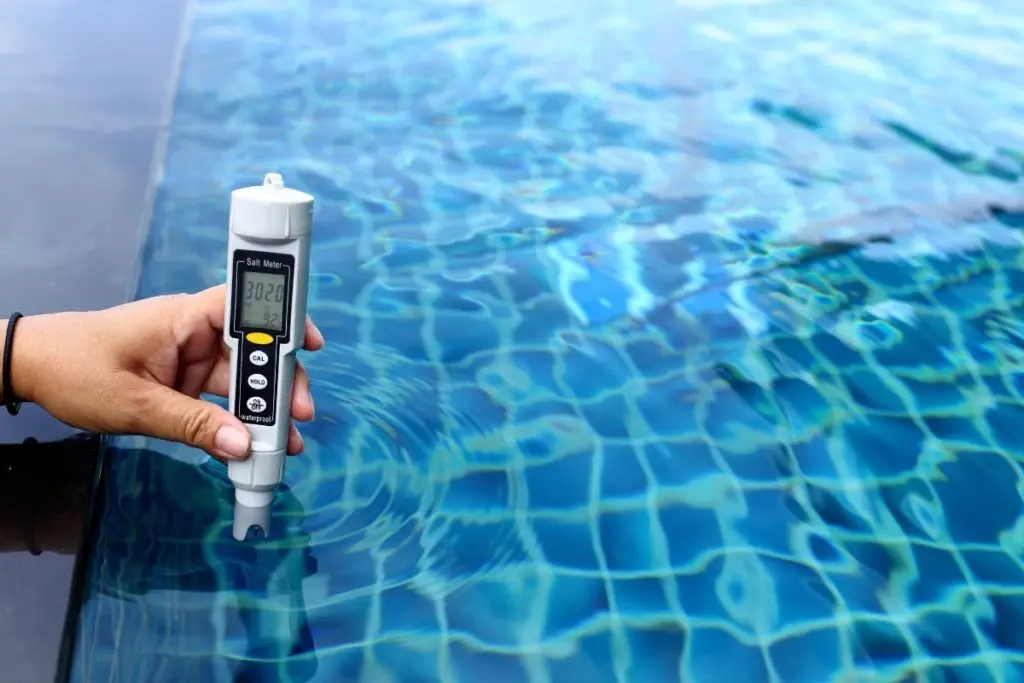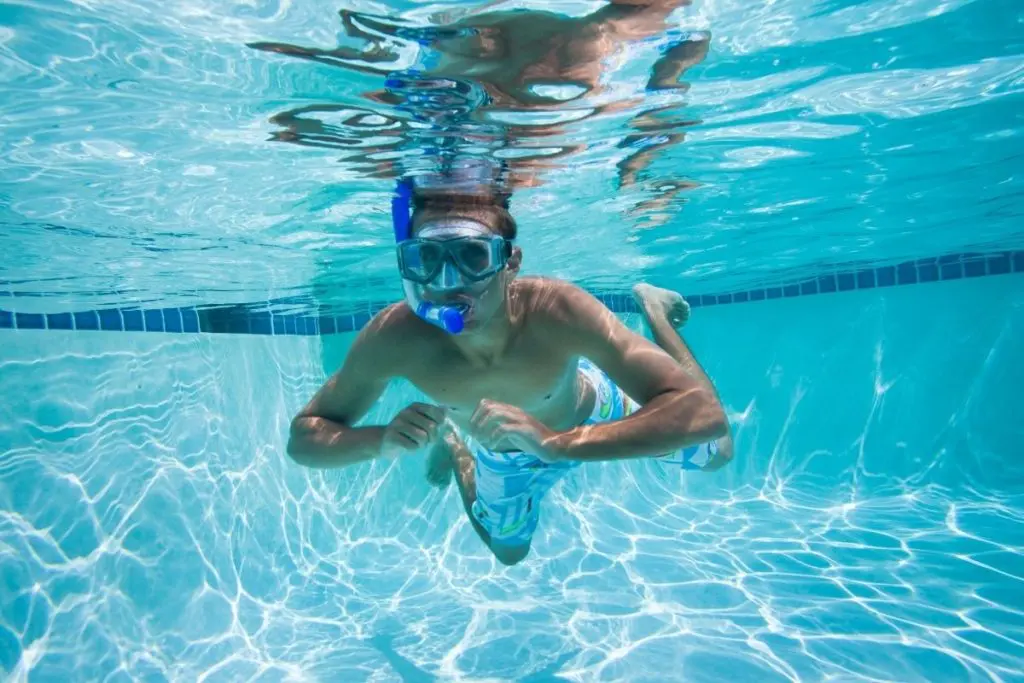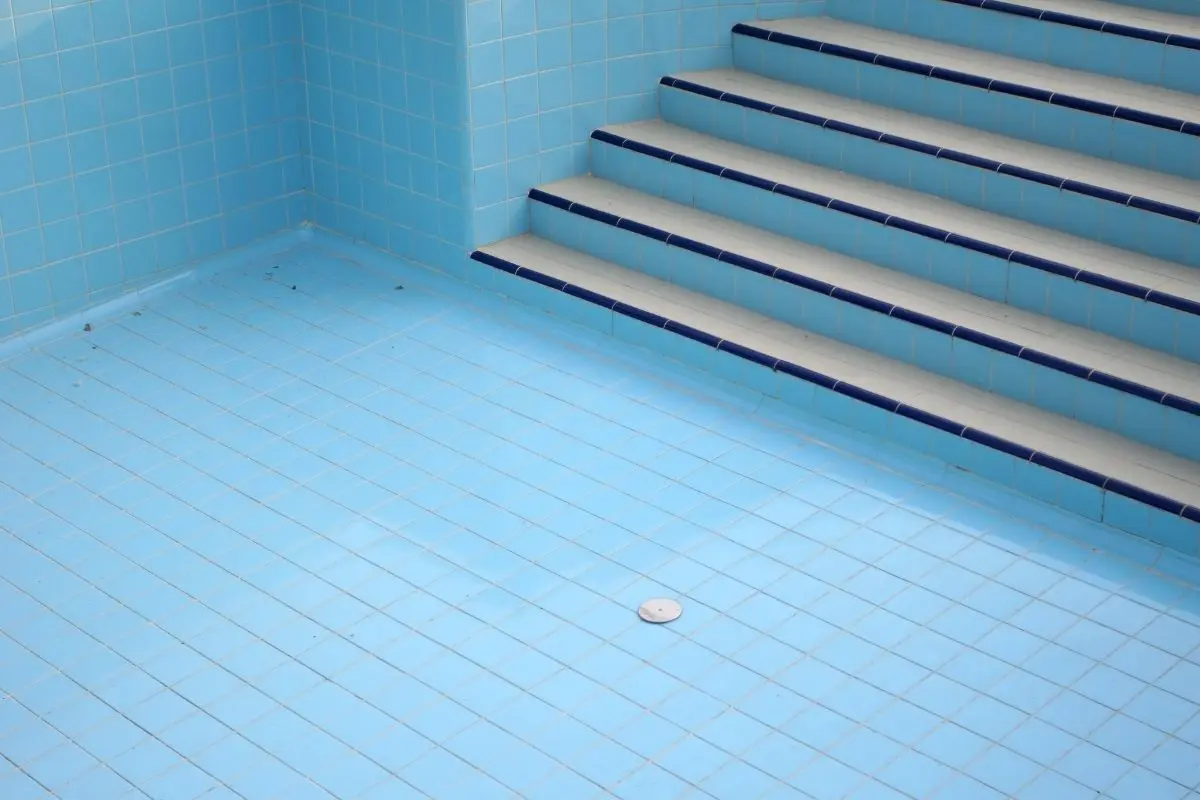The word “pool” likely conjures up summertime, laying on a towel in the sun, and the smell of chlorine. What is more reminiscent of childhood fun than a swimming pool? Flash forward to the present. Here you are doing the more adult work of deciding between a salt water pools vs. chlorine pools. Do you go for traditional nostalgic or see what the fuss is about with saltwater? Or maybe you want to learn a little more about the pros and cons of both and how they differ.
In a nutshell, the main difference between salt water pools and chlorine pools is that one generates its chlorine while you add chlorine to the other. The mechanism for keeping the water clean is the same (chlorine), but the results are different.
Read on to learn more, and for a full breakdown of salt water pools vs. chlorine pools over three categories: cost, maintenance, and health.
| Salt Water Pool | Chlorine Pool | |
| Cost | ✓ | |
| Maintenance | ✓ | |
| Health | ✓ |
Pros and Cons of Salt Water and Chlorine Pools

Even though chlorine pools and saltwater pools have some similarities, they also have important distinctions. First, let’s cover the basics.
Salt Water Pools
A salt water pool is all-natural, just like the ocean, right?
Well, not quite.
Saltwater pools are not nearly salty enough to kill common germs and viruses like E.coli or salmonella, so they require additional sanitization. The typical salinity level of a saltwater pool is around 3000 – 4000 parts per million, while the ocean is more like 35,000 ppm. You can swim in the ocean without worrying whether you’ll catch athletes’ foot (or worse) — but pools are a different matter.
Do salt water pools need chlorine?
This brings us to a widespread misconception: that salt water pools are chlorine-free. Both saltwater and freshwater pools use chlorine to eliminate harmful microbes but in different ways. A salt water pool generates its own using an electrolytic chlorine generator (ECG). In contrast, a chlorine pool relies on the addition of pre-made chlorine and other chemical stabilizers.
An ECG in a saltwater pool sanitizes water using a process called electrolysis. Electrolysis passes a current of electricity through a brine solution, separating and breaking down salt, or sodium chloride, which produces hypochlorous acid and sodium hypochlorite — a.k.a. chlorine.
Say what? Basically, this means that a saltwater pool turns salt into chlorine. But since it does this very steadily, levels are less concentrated than in a chlorine pool, and there’s less chlorine odor.
Salt Water Pool Pros:
- Less frequent chlorine testing
- Low odor and less chlorine smells
- Salt is easy and safe to use and store
- Reduced levels of chlorine and chloramine
- Gentler on hair, eyes, skin, and bathing suits
- Slightly less overall maintenance than chlorine pools
Salt Water Pool Cons:
- Higher startup costs
- Uses more electricity
- Requires hundreds of pounds of salt to operate, plus replacement salt throughout the season
- Salt water causes corrosion over time and is especially hard on fixtures or equipment with metal parts
- ECGs contain more parts and need to be cleaned, serviced and replaced more frequently (and expensively)
Chlorine Pools
While saltwater pools have grown quite a bit in popularity, chlorine pools are still the most common. This is in part because chlorine pools are so reliable. We know that a traditional chlorine pool does a thorough job making the water we swim in safe and free from harmful microbes. They’re also everywhere — hotels, local community centers, gyms, and more.
Because they’re so ubiquitous, we’re also very familiar with the after-effects of swimming in a chlorinated pool, like dealing with dry skin and straw hair, and the smell of chlorine lingering on our skin. And while these side effects aren’t ideal, most of us are pretty accustomed to them and accept them as part of swimming.
Chlorine Pool Pros:
- Lower electricity costs
- No salt corrosion on decks or pool machinery
- Significantly lower initial costs, less complicated setup
Chlorine Pool Cons:
- Strong chlorine odor
- Requires frequent monitoring of chlorine levels
- More overall maintenance than salt water pools
- Chlorine pools are hard on skin and hair, and can be harmful to those with health sensitivities or allergies
- Chlorine products are more difficult to handle than salt, and if stored or administered improperly, can be hazardous
Salt Water Pools vs. Chlorine Pools – Cost, Maintenance, & Health Benefits

Now that we’ve discussed the basics of saltwater pools vs. chlorine pools, it’s time for an in-depth comparison. Let’s start with cost.
Salt Water Pool vs. Chlorine Pool: Cost
1
Saltwater Pool Expenses
While saltwater pools have a lower average day-to-day cost, they’re significantly more costly than chlorine pools when it comes to initial start-up. The most significant expense is the electrolytic chlorine generator (ECG), which costs about $600-1,800, and around $200-500 to install. The salt cells inside an ECG generally last for around 4-5 years, so you should also factor in an eventual $200-700 for their replacement.
Ongoing costs include the salt itself, the amount of which will depend on the size of your pool. Small pools require something like 400 pounds of salt per year, whereas if you have a bigger pool, you could need up to 1,000 pounds of salt each year. That’s a whole lot of sodium chloride! For reference, salt is about 5 bucks for a 40-pound bag, so you’ll have some math to do.
Owners of saltwater pools should also figure in the cost of a specialized technician if your ECG breaks down, which it likely will eventually.
2
Chlorine Pool Expenses
Chlorine pool equipment, on the other hand, is usually easier and cheaper to fix without expert assistance if something goes wrong.
The ongoing chemical maintenance for a traditional pool is where you get hit in the pocketbook. Whereas a saltwater pool will cost approximately $100-200 in salt and other chemicals annually, chemicals for chlorine pools cost more like $300-800 each year.
Chlorine pools do come out slightly ahead in the category of electricity expenses. Using a traditional pool pump rather than a much more power-hungry ECG, can save you around $30-50 bucks per year.
3
Other Expenses
Finally, there are a few pool operation costs that people might not consider, like corrosiveness. Salt and salt water can cause damage to docks, metal pool parts, and more. Even poolside items like chairs and tables or nearby plants can be damaged by salt exposure. Salt can also stain or create pockmarks on stone and tiles if not properly sealed.
Chlorine is not so hard on its surroundings, though it tends to be more damaging to bathing suits and towels over the long term. Depending on your specific pool setup, some of these factors might be more important to you than others.
Climate can also affect costs. The warmer the weather, the more chlorine is required. That means additional chemicals for a chlorine pool — and additional electricity use, and faster wear on the salt cell units in a saltwater pool.
Another way to compare the expenses of salt water pool systems vs. chlorine pools is to figure out how much it costs to chlorinate each. Through this lens, a salt water pool is technically cheaper overall, since it costs about $1 per pound to make chlorine with an ECG, while the chlorine you buy off the shelf costs around $2 to $4 per pound. Looking at the long term, you may even be able to recoup the initial expenses of a saltwater pool over time by taking advantage of its cheaper average daily costs.
Winner: When comparing salt water pool vs. chlorine cost, chlorine pools eke out just ahead. This is mainly due to startup costs for a saltwater pool far exceeding those of a chlorine pool, though ongoing costs are fairly similar.
Salt Water Pool Maintenance vs. Chlorine Pool Maintenance

At first glance, salt water pools seem like they’re much easier to maintain. And (spoiler alert) we agree that overall, they are. But while they might require a little less ongoing maintenance, all pools require regular and careful monitoring. It’s true that chlorine pools use chemicals that need more frequent checking and testing, but it isn’t true that salt pools are a “set it and forget it” situation.
Whether you choose a chlorine pool or a saltwater pool, you’ll need to purchase and add something to your pool no matter what, whether that’s salt, chlorine, or other balancing chemicals.
Saltwater Pool Maintenance 101
The beginning of the season is when you’ll do the heaviest lifting (literally) with a saltwater pool — you’ll need to add at least several hundred pounds of salt to your pool water. Pool experts also recommend a few more steps throughout the season to prevent algae buildup and bacteria:
Saltwater Pool Costs
- Regular cleaning of walls and debris removal
- Periodically adding more pool salt whenever levels dip
- “Shocking” your salt pool once a week with a salinity oxidizing shock product, and then using an algaecide product 24 hours afterwards
- Other monthly and annual maintenance tasks
We also recommend that you inspect your salt cell every 3-6 months for excess calcium build up.
Chlorine Pool Maintenance 101
If you have a chlorine pool, it’s important to check your chlorine levels once or twice a week. If your pool gets more frequent use, or you’re having a lot of pool parties, you should check chemical levels daily.
In addition, chlorine pool maintenance includes:
Chlorine Pool Costs
- Shocking the pool once a week
- Regularly cleaning walls with surface cleaner
- Skimming/cleaning your pool once or twice a week to remove debris
- Keeping an eye on pH levels about twice a week, with test strips or a testing kit
- Other monthly and annual maintenance tasks
Since chlorine is a more volatile substance than salt, transporting it, adding just the right amount, and then carefully storing it requires more thought and care. The overall process of dealing with pool chemicals is more cumbersome (and potentially hazardous) than what is required with a saltwater pool.
Winner: Both types of pools require significant maintenance, but a saltwater pool is a little easier to monitor and doesn’t require handling chlorine.
Salt Water Pool vs. Chlorine Pool: Health

First and foremost, killing harmful germs in pool water is your number one health priority, regardless of whether you have a freshwater or saltwater pool. Without sanitizing chemicals, pools are giant Petri dishes. It’s critical to take disinfection very seriously if you don’t want all of your pool guests coming down with swimmer’s ear. Or pink eye. Or a bout of diarrhea.
Many people assume that since “salt” sounds more natural than “chlorine,” there are fewer chemicals associated with salt water pools. The truth is more complicated. Both salt and chlorine are naturally occurring elements and not harmful when used properly.
That said, chlorine pools do have higher amounts of chloramines in the water than saltwater pools. Even a pool with “perfect” levels of chlorine can still cause itchy skin or dry hair, or leave that distinctive smell coming off of your suit or towel for hours.
This is one of the most significant benefits of salt water pools over chlorine pools: the chlorine concentration is not nearly as intense. Less concentration means less chlorine odor and less discoloration of hair, and in particular, less skin irritation.
Since the salinity of a saltwater pool is similar to that of human tears, this generally means that saltwater pools also cause less eye stinging. And without so much chlorine clinging to your body and bathing suit, saltwater pool owners report that the water just generally feels better.
When considering the health effects of chlorine and salt, it’s also worth noting the handling of both. It’s generally much easier — and safer — to store and handle salt. Unlike commercially packaged chlorine, salt does not produce fumes of any kind, need careful handling, or require specific storage considerations.
Winner: Neither a properly-maintained chlorine pool or a saltwater pool is terrible for your health. Still, most people find that chlorine pools cause more skin and eye irritation. When comparing health benefits of salt water pools vs. chlorine pools, salt water comes out on top.
Which is Best: Salt Water Pools or Chlorine Pools?

As is the case with most things: it depends! Saltwater pools are more expensive initially but less expensive and a little easier to maintain down the line. Since saltwater pools generate their own chlorine, levels stay more constant and require less monitoring and adjusting.
But chlorine pools are still a familiar classic, and chlorine water won’t corrode metal parts or damage concrete or tile. A chlorine pool costs much less to get going — and if you don’t mind monitoring, storing, and smelling chlorine — is a perfectly good choice.
